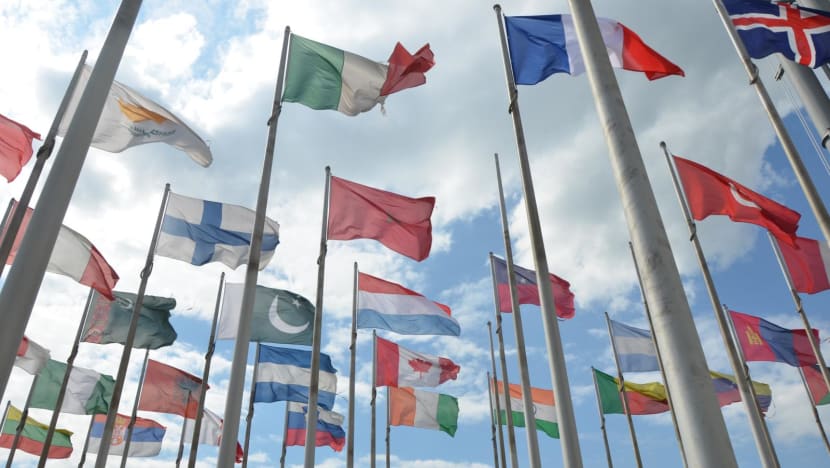Commentary: The resurgence of the nation state and its implications for the world
The nation state looks stronger than ever as governments increasingly prioritise national security over economic considerations, says the Lee Kuan Yew School of Public Policy’s Terence Ho.


This audio is generated by an AI tool.
SINGAPORE: In April, the United States passed a law that would ban popular video-sharing app TikTok in the country unless it is divested by Chinese parent company ByteDance within a year. This is despite TikTok having some 170 million users in the US, including business owners who depend on it for income. While the threat to ban TikTok reflects growing US-China rivalry, it also suggests that the balance of power is shifting in favour of states over multinational corporations.
The supremacy of the nation state has not always been a given. As a student in the United Kingdom in the 1990s, I became aware of a major bugbear of some within the UK political establishment: The loss of national autonomy to shadowy unelected forces, in particular, the European Union as a supranational institution, as well as multinational corporations that could exert pressure on governments through their considerable influence on the economy.
The reaction to this encroachment on national sovereignty was entirely understandable. Why should the will of the people, expressed through the ballot box in a parliamentary democracy, be circumscribed by “faceless bureaucrats” in Brussels? And why should a nation’s domestic and international policy be subordinated to the interests of multinational corporation (MNCs) playing off one country against another?
Two decades later, the nation state looks stronger than ever as governments reassert themselves vis-à-vis corporations, and national security is increasingly prioritised over economic considerations. However, the weakening of restraints on the nation state may in fact make for a less stable or peaceful world as geopolitical rivalries intensify. While economic interdependence is no guarantee against the outbreak of armed conflict, economic decoupling or “de-risking” could increase the likelihood of war by lowering the cost of hostilities between nations.
The relative dearth of countervailing forces to keep nation states in check, whether institutions, corporations, shared beliefs or common causes, points to the urgent need for steps to build bridges and strengthen interdependence among states.
GLOBAL GOVERNANCE STRUCTURES LACKING
If there were already doubts about the effectiveness of global institutions and frameworks in sustaining peace and promoting cooperation, the ongoing wars in Ukraine and the Middle East have brought the weaknesses of the multilateral system into even sharper focus.
In an anarchic world, no single power is able to bend other countries to its will, with the US’ once unipolar dominance now undercut by the rise of China and the Global South.
Neither are there good prospects for stronger global governance without a fundamental reform of the United Nations Security Council (UNSC), where sharp divisions among the veto-wielding permanent members have rendered the council practically dysfunctional.
The notion of a “capitalist peace” - the proposition that increased economic interdependence between countries makes them unlikely to go to war - has been undermined by Russia’s invasion of Ukraine, notwithstanding Russia’s integration into the global economic and financial system, and Europe’s energy dependence on Russia prior to the war. Few today would assert that the US’ and China’s economic interdependence makes war between the two superpowers inconceivable.
MULTINATIONALS REINED IN AMID DEGLOBALISING FORCES
Concurrently, the influence of MNCs is waning as globalisation retreats and national governments reassert themselves.
The US government has sued Amazon, Meta and Google for violations of antitrust law, and is now moving against Apple. The captains of Big Tech are regularly summoned to the Capitol to be interrogated by members of Congress on anything from data privacy to the spread of online disinformation.
In Europe, the recently enacted Digital Markets Act will force internet giants to open up their platforms to rivals and give the EU power to force companies to sell off parts of their business.
These moves are relatively mild compared with China’s crackdown on its own tech giants. In 2020, Ant Group’s initial public offering was quashed soon after Alibaba co-founder Jack Ma aimed criticism at Chinese regulators. Other Chinese companies, including Tencent and Meituan, also came under heightened scrutiny by Beijing’s antitrust authorities, sending shudders through the financial markets and wiping off trillions of dollars in market value.
Meanwhile, the OECD’s Base Erosion and Profit Shifting (BEPS) initiative is gaining momentum, with over 140 jurisdictions set to implement measures to streamline tax rules and limit the scope for tax avoidance. By levelling the playing field, it will be more difficult for MNCs to exploit the competition for foreign direct investment to extract tax incentives and other concessions from national governments.
This, together with a suite of other measures from investment screening to trade restrictions, are subjecting MNCs to increasingly stringent regulation by national governments.
WHAT’S NEEDED TODAY
Given the erosion of effective checks on state power, national leadership becomes all the more critical in upholding peace and stability. While a confluence of factors brought about the end of the Cold War, presidents Ronald Reagan and Mikhail Gorbachev undoubtedly played a key part. Leaders must be able to sell, both to their own people and those of rival nations, a vision of a better world based on cooperation rather than conflict. It helps if such leaders enjoy a strong domestic position that enables them to make concessions without appearing weak.
Investment in regional projects and initiatives can also make a difference, and should not be limited to a small circle of friendly nations. While this alone will not guarantee peace, it will raise the relative cost of armed hostility among the states involved. This is a different logic to “de-risking” in the national security sense; it is de-risking from the possibility of conflict. Partnerships in joint projects to advance humankind, whether in research, space or climate action, should as far as possible be insulated from geopolitical interference.
It is important to sustain people-to-people exchanges across national boundaries. At the minimum, governments should not get in the way of grassroots efforts to promote mutual understanding and goodwill. While there is understandable concern about malign foreign influence, there are ways to mitigate risks without curtailing the flow of people across borders for education, work and leisure. Encouragement should be given to non-governmental efforts by benign actors to build trust and understanding.
Finally, it is up to citizens to hold their governments to account for the collective good. This is certainly easier in free societies than in authoritarian states that are able to impose significant costs on dissenters. Given that most people across the world have a strong preference for peace over war, accountability to citizens may well be one of the most effective restraints on the state.
Terence Ho is Associate Professor in Practice at the Lee Kuan Yew School of Public Policy. He is the author of Governing Well: Reflections on Singapore and Beyond (2023).


















